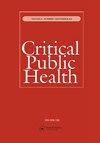Towards a theoretically grounded, social democratic public health
IF 2.3
3区 医学
Q2 PUBLIC, ENVIRONMENTAL & OCCUPATIONAL HEALTH
引用次数: 2
Abstract
The Editorial Board recently made revisions to Critical Public Health’s (CPH) Aims and Scopes. One change was to explicitly invite submissions focusing on the political economy of (public) health and to add political science and policy studies to the (non-exhaustive) indicative list of disciplinary perspectives that shed important light on issues of equity and power in public health. With those changes in mind, a recent paper by Walby, published in the European Journal of Social Theory (Walby, 2021) caught our eye. The paper considers the question of social theory as it relates to public health, specifically in the context of the COVID-19 pandemic. Briefly (the reader is encouraged to read the excellent full paper), Walby draws on Delanty’s (2020) review of the response of social theory to the impact of COVID-19, which identified six political philosophical positions on the relationship between the individual and society: utilitarian, Kantian, libertarian, biopolitical securitisation, postcapitalism, and behaviouralism. Walby points out that the concept of ‘social democracy’ is “curiously absent” amongst these positions. She defines social democracy in relation to public health as “a project, form of governance and societal formation, in which if one is sick, we are all potentially sick”. Its omission, Walby argues, is significant because “social democratic visions and practices underpin the theory and practice of ‘public health’” (2021, p. 24). In Walby’s view, a social democratic public health is one which offers “solidaristic provision of welfare to support [everyone]”, thus making it “both efficient and just simultaneously” (2021, p. 38). Here we see a combination of nuanced concerns around the intersection of effective governance and social justice. Critical theory in this journal has been, perhaps, skewed towards Foucauldian perspectives that position public health regimes as biopower, contributing to surveillance. There is a need for public health and other critical theorists to focus on the potential for a more positive, social democratic model of public health. In this editorial, we seek to address the question of what public health communities might have to do, to ensure that we foreground and prioritise social democratic visions and practices. Walby’s analysis raises three crucial issues for public health scholars to consider. Firstly, through the ways in which it mobilises different modes of social theory to characterise the public health response, it provides a modus for thinking about the form and function of social theory in the processes and practices of public health. In turn, this allows us to put into perspective some dominant trends – including blind spots – in critical public health. For example, through mobilizing the biopolitical perspective, Foucault is frequently invoked in critical contexts to analyze ‘state-authorized’ public health measures to contain communicable disease spread (including but not limited to COVID-19) such as lockdown, distancing, and contact tracing, as unjust forms of authoritarian surveillance and disciplining. Walby’s discussion raises issues of how to balance critical approaches to public health which have traditionally focused on its role as part of the apparatus of state control with social democratic approaches which position is a bulwark against neoliberal states. A question this raises for us is how best to consider the implications of Walby’s social democratic theorization of public health state intervention, and how best to develop this as a dominant alternative theorization to neoliberalism in public health. From a cursory review of output from this journal it is apparent that this is a perspective that is largely missing from CPH. It is our view that a social democratic theorization of public health allows for the prioritising of a model of public health that is mobilized in the interest of social justice and democracy. Consider, for example, important research within Latin American social medicine traditions (e.g. Adams et al., 2019). CRITICAL PUBLIC HEALTH 2022, VOL. 32, NO. 5, 589–591 https://doi.org/10.1080/09581596.2022.2119053建立一个有理论基础的、社会民主的公共卫生
编辑委员会最近对《关键公共卫生》的目标和范围进行了修订。一个变化是明确邀请提交侧重于(公共)卫生的政治经济学的材料,并将政治科学和政策研究添加到(非详尽的)学科观点指示性清单中,这些观点对公共卫生中的公平和权力问题有重要的启示。考虑到这些变化,沃尔比最近发表在《欧洲社会理论杂志》(沃尔比,2021)上的一篇论文引起了我们的注意。本文考虑了与公共卫生有关的社会理论问题,特别是在新冠肺炎大流行的背景下。简言之(鼓励读者阅读优秀的全文),Walby借鉴了Delanty(2020)对社会理论对新冠肺炎影响的反应的评论,其中确定了关于个人与社会关系的六个政治哲学立场:功利主义、康德主义、自由主义、生物政治证券化、后资本主义和行为主义。沃尔比指出,“社会民主”的概念在这些立场中“奇怪地缺席”。她将与公共卫生相关的社会民主定义为“一个项目、治理形式和社会形成,在这个项目中,如果一个人生病了,我们都有可能生病”。沃尔比认为,它的遗漏意义重大,因为“社会民主愿景和实践支撑着‘公共卫生’的理论和实践”(2021,第24页)。在沃尔比看来,社会民主的公共卫生是指提供“团结一致的福利来支持[每个人]”,从而使其“既高效又公正”(2021,第38页)。在这里,我们看到了围绕有效治理和社会正义交叉点的微妙担忧的结合。这本杂志上的批判理论可能倾向于福柯式的观点,将公共卫生制度定位为生物权力,有助于监督。公共卫生和其他批判理论家需要关注建立一个更积极、社会民主的公共卫生模式的潜力。在这篇社论中,我们试图解决公共卫生社区可能必须做什么的问题,以确保我们展望并优先考虑社会民主愿景和实践。沃尔比的分析提出了公共卫生学者需要考虑的三个关键问题。首先,通过调动不同的社会理论模式来描述公共卫生反应,它为思考社会理论在公共卫生过程和实践中的形式和功能提供了一种方式。反过来,这使我们能够正确看待关键公共卫生领域的一些主导趋势,包括盲点。例如,通过调动生物政治视角,福柯经常在关键背景下被用来分析“国家授权”的公共卫生措施,以遏制传染病传播(包括但不限于新冠肺炎),如封锁、保持距离和追踪接触者,作为不公正的威权监督和纪律形式。沃尔比的讨论提出了如何平衡公共卫生的关键方法和社会民主方法的问题,传统上,这些方法侧重于公共卫生作为国家控制机构的一部分的作用,而社会民主方法是对抗新自由主义国家的堡垒。这给我们提出的一个问题是,如何最好地考虑沃尔比关于公共卫生国家干预的社会民主理论的含义,以及如何最好地将其发展为公共卫生中新自由主义的主导替代理论。粗略回顾一下本期刊的产出,很明显,这是CPH在很大程度上缺失的观点。我们认为,公共卫生的社会民主理论允许优先考虑为社会正义和民主利益而动员的公共卫生模式。例如,考虑拉丁美洲社会医学传统中的重要研究(例如Adams等人,2019)。《2022年关键公共卫生》,第32卷,第5期,589-591https://doi.org/10.1080/09581596.2022.2119053
本文章由计算机程序翻译,如有差异,请以英文原文为准。
求助全文
约1分钟内获得全文
求助全文
来源期刊

Critical Public Health
Multiple-
CiteScore
5.90
自引率
7.10%
发文量
36
期刊介绍:
Critical Public Health (CPH) is a respected peer-review journal for researchers and practitioners working in public health, health promotion and related fields. It brings together international scholarship to provide critical analyses of theory and practice, reviews of literature and explorations of new ways of working. The journal publishes high quality work that is open and critical in perspective and which reports on current research and debates in the field. CPH encourages an interdisciplinary focus and features innovative analyses. It is committed to exploring and debating issues of equity and social justice; in particular, issues of sexism, racism and other forms of oppression.
 求助内容:
求助内容: 应助结果提醒方式:
应助结果提醒方式:


